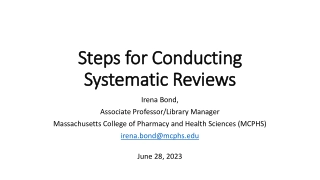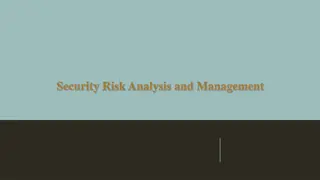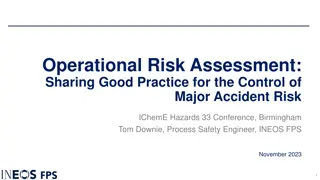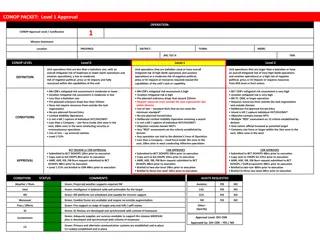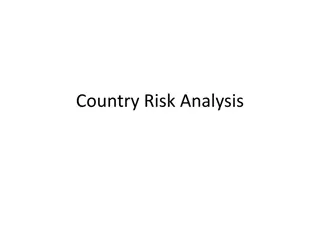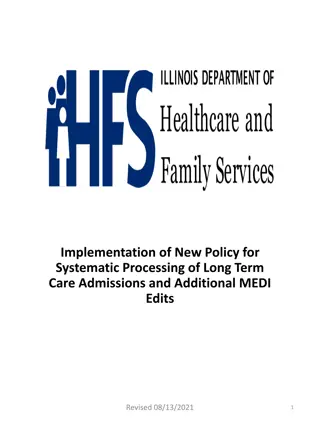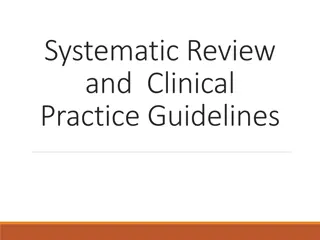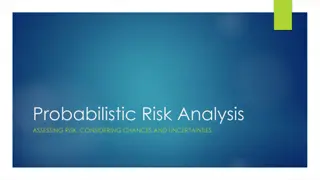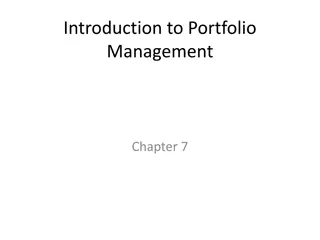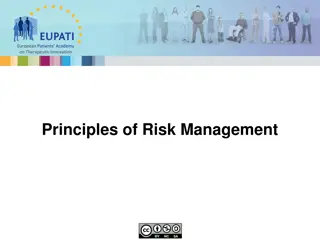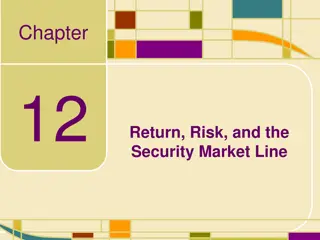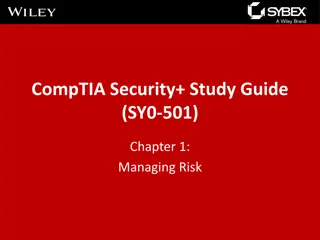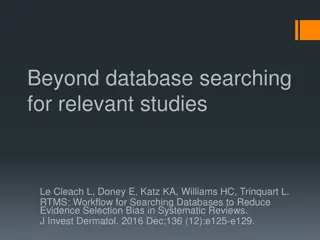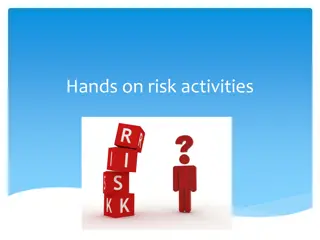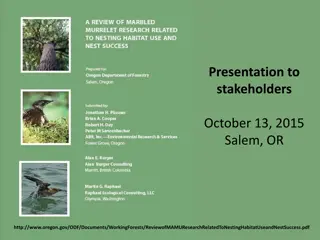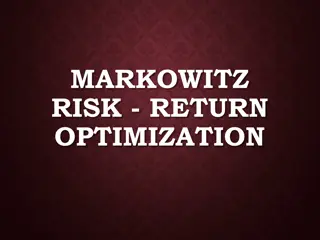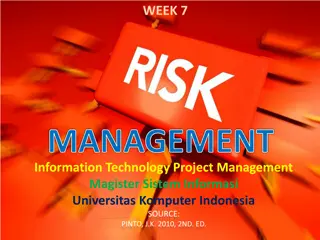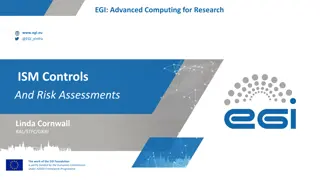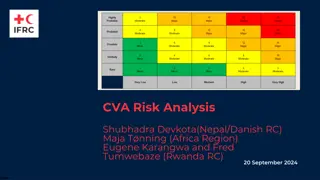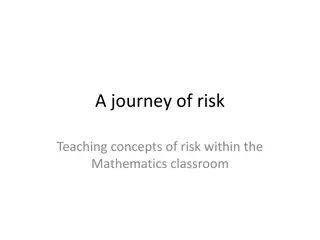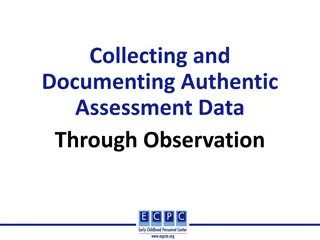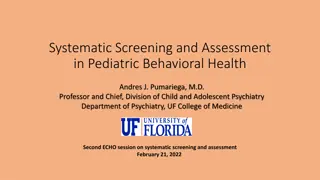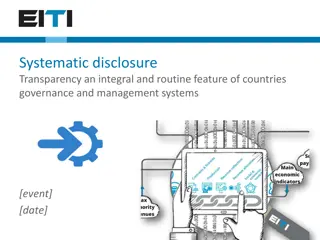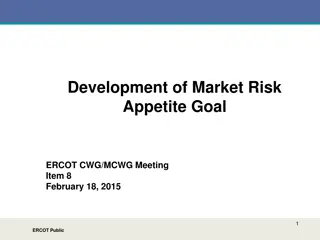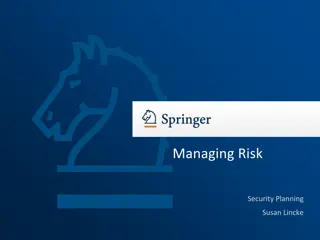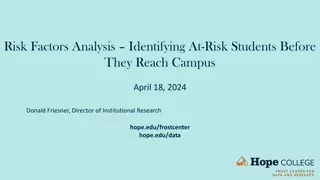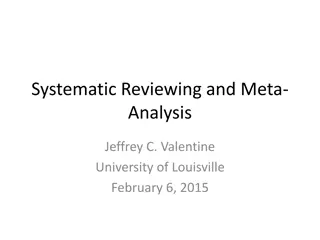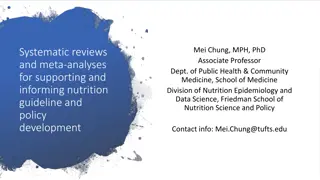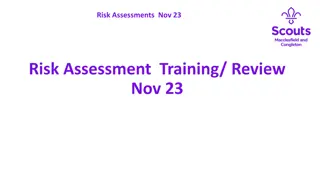Steps for Conducting Systematic Reviews
Systematic reviews are a crucial method for summarizing evidence effectively. This comprehensive guide by Irena Bond provides step-by-step instructions for beginners and junior researchers, including defining a research question, developing inclusion criteria, conducting a search, data extraction, q
4 views • 27 slides
Comprehensive Overview of Security Risk Analysis and Management
Explore the essential aspects of security risk analysis and management, including risk identification, assessment, and control techniques within an Information Security (InfoSec) context. Learn about the purpose of risk management, steps involved in a risk management plan, asset identification and c
0 views • 22 slides
Understanding Risk Management in Environmental Geography and Disaster Management
Risk management in environmental geography and disaster management involves assessing the potential losses from hazards, evaluating vulnerability and exposure, and implementing strategies to mitigate risks. It includes calculating risk, dealing with risk through acceptance, avoidance, reduction, or
1 views • 10 slides
Introduction to Flood Risk Assessment with HEC-FDA Overview
This presentation delves into flood risk assessment using HEC-FDA software, covering topics such as defining flood risk, components of uncertainty, consequences of flood risk, and methods to assess flood risk including hydrology, hydraulics, geotechnical, and economics. It explores the intersection
6 views • 39 slides
Operational Risk Assessment for Major Accident Control: Insights from IChemE Hazards 33 Conference
This content provides valuable insights into the importance of Operational Risk Assessment (ORA) in managing major accident risks in high hazard industries. It covers the necessity of ORA, identifying changes, risk assessment, and key success factors. Real-life examples like the Buncefield Terminal
0 views • 22 slides
Unit Operations Approval Protocol Summary
This document outlines the approval process for unit operations categorized by size and risk level, covering factors such as mitigated risk assessment, resource requirements, and operational specifics. It delineates three levels of operations based on risk assessment criteria and the involvement of
1 views • 12 slides
Understanding Agricultural Risk Management in the Face of Natural Disasters
Exploring the impact of natural disasters on agricultural economics, this content delves into the challenges faced by farmers and the approaches available for managing risks. From analyzing the Billion-Dollar Disasters in the US to discussing private and public risk management provisions, the conten
3 views • 20 slides
Understanding Country Risk Analysis in International Business
Country risk analysis is crucial for multinational corporations (MNCs) to assess the potential impact of a country's environment on their financial outcomes. It includes evaluations of political and economic risks in foreign operations. Sovereign risk, political risk characteristics, and factors are
1 views • 61 slides
New Policy for Systematic Processing of Long Term Care Admissions
This policy outlines significant changes in the processing of long-term care admissions through MEDI, aiming to streamline the submission process, improve efficiency, and reduce delays in reimbursement. Key updates include systematic editing upon submission, eligibility criteria for systematic proce
2 views • 34 slides
Understanding Systematic Reviews, Meta-analysis, and Clinical Practice Guidelines
Explore the importance of systematic reviews, critical appraisal questions, meta-analysis, and clinical practice guidelines in the healthcare field. Learn about the process of appraising systematic reviews, the significance of meta-analysis, and the benefits of following clinical practice guidelines
1 views • 16 slides
Enhancing Zoonotic Disease Risk Communication in Public Health Emergencies
Explore the significance of adopting a One Health approach to zoonotic disease risk assessment and communication in the context of emergency health situations. The session emphasizes core capacities required by the International Health Regulations (IHR) 2005, effective risk communication processes,
2 views • 13 slides
Understanding Probabilistic Risk Analysis: Assessing Risk and Uncertainties
Probabilistic Risk Analysis (PRA) involves evaluating risk by considering probabilities and uncertainties. It assesses the likelihood of hazards occurring using reliable data sources. Risk is the probability of a hazard happening, which cannot be precisely determined due to uncertainties. PRA incorp
1 views • 12 slides
Project Risk Management Fundamentals: A Comprehensive Overview
Project risk management involves minimizing potential risks and maximizing opportunities through processes such as risk management planning, risk identification, qualitative and quantitative risk analysis, risk response planning, and risk monitoring and control. Quantitative risk analysis assesses t
0 views • 41 slides
Fundamentals of Portfolio Management and Risk Aversion in Investing
Portfolio theory is based on the principles of maximizing returns for a given risk level, considering all assets owned. Investors typically exhibit risk aversion, preferring lower risk assets for similar returns. Risk is defined as future outcome uncertainty. Markowitz Portfolio Theory highlights th
1 views • 17 slides
Principles of Risk Management in Therapeutic Innovation
European Patients Academy emphasizes the importance of risk management in therapeutic innovation. Understanding the balance between benefits and risks, implementing risk management strategies for all medicines, and identifying different types of risks are crucial for ensuring patient safety and publ
0 views • 13 slides
Understanding Risk and Return in Financial Markets
This chapter delves into the concepts of risk and return in financial markets, exploring the relationship between expected and unexpected returns, systematic and unsystematic risk, and the Security Market Line. It also discusses the impact of announcements and news on stock returns, distinguishing b
1 views • 73 slides
Risk Management Strategies in Organizational Security
Exploring risk management in organizational security, this study guide delves into resiliency, automation strategies, policies, and procedures to reduce risk. It covers threat assessments, computing risk assessments, qualitative vs. quantitative risk measurements, and actions based on risk assessmen
1 views • 19 slides
Managing Reporting Bias in Systematic Reviews - Strategies and Consequences
Reporting bias poses a significant threat to the accuracy of systematic reviews, with publication bias affecting up to 50% of trials. This bias distorts treatment effect estimates, leading to exaggerated outcomes. Strategies to mitigate reporting bias include searching bibliographical databases, exp
1 views • 17 slides
Understanding Risk: Definitions and Concepts Explored
Delve into the world of risk with definitions ranging from baseline and absolute risk to relative risk, providing insights into how we perceive and manage uncertainties in various aspects of life. Explore the nuances of risk through engaging activities and gain a deeper understanding of statistical
0 views • 22 slides
Systematic Review of Marbled Murrelet Research in Oregon State Forests
A presentation to stakeholders in Salem, OR, on October 13, 2015, highlighted the systematic review conducted by the State Forests Division on Marbled Murrelet research. The review aimed to assess the science related to key elements of the PSG protocol and other hypotheses. The Division outlined the
0 views • 59 slides
Understanding Markowitz Risk-Return Optimization
Modern portfolio theory, introduced by Harry Markowitz, aims to maximize expected return while managing risk. Efficient portfolios are represented by points on the efficient frontier, diversifying investments for optimal risk-return trade-offs. The risk-expected return relationship is depicted graph
0 views • 16 slides
Understanding Risk Concepts and Management Strategies in Finance
Explore the essential concepts of risk in finance, such as risk definition, risk profiles, financial exposure, and types of financial risks. Learn about risk vs. reward trade-offs, identifying risk profiles, and tools to control financial risk. Understand the balance between risk and return, and the
0 views • 18 slides
Risk Management in Information Technology Project
Project risk is any potential event that can harm a project's success. Risk management involves identifying, analyzing, and responding to risks throughout the project's lifecycle to safeguard its objectives. The process includes risk identification, analysis of probability and consequences, risk mit
0 views • 16 slides
Risk and Return Assessment in Financial Management
This comprehensive presentation explores the intricacies of risk and return assessment in the realm of financial management. Delve into understanding risk concepts, measuring risk and return, major risk categories, and the impact of risk aversion on investment decisions. Gain insights into the manag
0 views • 62 slides
Risk Management and Security Controls in Research Computing
The European Grid Infrastructure (EGI) Foundation conducts risk assessments and implements security controls in collaboration with the EOSC-hub project. The risk assessments involve evaluating threats, determining likelihood and impact, and recommending treatment for high-risk threats. Results from
0 views • 13 slides
Risk Management & MPTF Portfolio Analysis at Programme Level for UN Somalia
This session delves into the world of risk management and portfolio analysis at the programme/project level, specifically focusing on the Risk Management Unit of the United Nations Somalia. It covers enterprise risk management standards, planned risk management actions, the role of RMU, joint risk m
0 views • 30 slides
Comprehensive CVA Risk Analysis and Management Overview
This detailed document delves into the importance of CVA Risk Analysis, introducing the CVA risk register and outlining the identification, mitigation, and management of risks. It emphasizes understanding root causes and gaining confidence in filling the Risk Register. Additionally, it discusses the
0 views • 12 slides
Alcohol and Cancer Risk: Understanding the Links
Alcohol consumption is linked to an increased risk of various cancers, including mouth, throat, esophagus, breast, liver, and colorectal cancers. Factors such as ethanol, acetaldehyde, nutrient absorption, estrogen levels, and liver cirrhosis play a role in this risk. Even light drinking can elevate
0 views • 17 slides
Understanding Risk Concepts in the Mathematics Classroom
Risk is a concept integral to decision-making in various aspects of life. This resource explores how risk is defined in the real world, its relevance in the classroom, and strategies for teaching risk literacy to students. It delves into the multiple definitions of risk, risk analysis, and the emoti
0 views • 62 slides
Authentic Assessment through Systematic Observation: Best Practices
Explore the process of authentic assessment through systematic observation in early childhood education. Learn about collecting, documenting, and interpreting assessment data using evidence-based practices and technology. Discover the importance of working collaboratively with families and professio
0 views • 53 slides
Importance of Systematic Screening and Assessment in Pediatric Behavioral Health
This content discusses the significance of systematic screening and assessment tools in pediatric behavioral health. It highlights the rationale for using these tools to improve access, reduce bias, ensure comprehensive assessment, enhance validity, and efficiently triage patient needs. The case stu
0 views • 8 slides
Enhancing Governance through Systematic Disclosure and Transparency
Systematic disclosure and transparency play a crucial role in the governance and management systems of countries. This involves routine disclosure of information, such as financial data, to promote accountability and address gaps in information. The EITI Standard emphasizes the importance of mainstr
0 views • 23 slides
Understanding Organizational Risk Appetite and Tolerance
Explore the development of market risk appetite goals and how to define and establish organizational risk tolerance. Learn about the Classic Simplified View of Risk Tolerance and different methods to determine risk appetite. Discover the importance of assessing market risk impact and aligning risk t
0 views • 8 slides
Developing a Risk Appetite Culture: Importance and Framework
Risk management plays a critical role in the success of corporations, with strategy and risk being intertwined. This presentation delves into definitions of key terms such as risk appetite, the Risk Appetite Cycle, characteristics of a well-defined risk appetite, and the importance of expressing ris
0 views • 31 slides
Security Planning and Risk Management Overview
This content provides an in-depth exploration of managing risk, security planning, and risk appetite in the context of cybersecurity. It covers essential concepts such as risk management process, threat types, risk analysis strategies, vulnerability assessment, and risk mitigation techniques. The ma
0 views • 73 slides
Risk Factors Analysis: Identifying At-Risk Students Before They Reach Campus
Risk Factors Analysis aims to identify students at risk of attrition before they even arrive on campus by evaluating academic, financial, minority, and first-generation factors. The method involves choosing specific risk factors, tracking historical prevalence, calculating relative risk, and predict
0 views • 15 slides
Understanding Systematic Reviewing and Meta-Analysis
Explore the significance of systematic reviewing and meta-analysis in research literature, including definitions, options for conducting reviews, and reasons for the shift away from narrative reviewing. Discover the essential principles and future directions of systematic review practices.
0 views • 52 slides
Role of Systematic Reviews in Nutrition Guideline Development
Mei Chung, MPH, PhD, an Associate Professor in the field of Nutrition Epidemiology and Data Science, plays a significant role in conducting systematic reviews and meta-analyses to support and inform nutrition guideline and policy development. Her work involves identifying research gaps, informing po
0 views • 5 slides
Equilibrium and Acid-Base Problems in Chemistry Lecture
In this lecture, topics such as Advanced Equilibrium, Acid/Base Equilibria, Systematic Method for solving chemical problems, Strong Acid/Strong Base scenarios, and General Comments on reactions are discussed. Examples using the systematic method are provided for practical understanding. Key points o
0 views • 13 slides
Comprehensive Risk Assessment Training Overview
In this risk assessment training session held on November 23, participants reviewed the process of writing and reviewing risk assessments to enhance the quality of assessments for safer scouting experiences. The training aimed to improve leaders' skills and confidence in risk assessment practices wh
0 views • 37 slides
